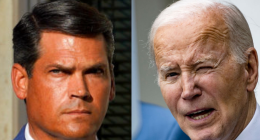
As late-night television hosting transitions go, The Daily Show had a smooth one back in 2015.
Jon Stewart announced he was leaving that February. In March, Comedy Central revealed that his replacement would be Trevor Noah, a barely known correspondent from the show. Stewart filmed his last episode in August and Noah filmed his first episode in September.
In short, this wasn’t Jay Leno and David Letterman jockeying for position at NBC to take over for Johnny Carson on The Tonight Show, leading to late night’s version of the Great Schism. It also wasn’t Conan O’Brien taking over as host of The Tonight Show with Jay Leno sent into primetime exile, rebuilding his strength and preparing to leave the Elba of the 10 p.m. hour to retake the throne at the earliest sign of weakness.
No, everybody at The Daily Show said and did the right things, conveyed the impression of an orderly transition of power. The network, the show and Stewart all gave every impression of wanting to see Noah succeed, and I sincerely believe that they did. At the same time, everybody had to know that anybody taking over for Jon Stewart was doomed to fail.
Stewart replaced Craig Kilborn as host in early 1999. Kilborn had done well enough to get a presumably more lucrative gig replacing Tom Snyder on CBS’ The Late Late Show. The Daily Show he was leaving was a clever, frivolous, fratty program defined by a few well-loved recurring bits — Five Questions, Your Moment of Zen — and a few well-loved correspondents. Still, it wasn’t THE DAILY SHOW and, frankly, Jon Stewart at that point wasn’t JON STEWART. But Jon Stewart and The Daily Show came of age together and became perhaps the key piece of comedic discourse for the ’00s. The show became smart. The show became truly funny. And the correspondents, one after another, became breakout stars.
Then Stewart left the juggernaut, and he left it in the hands of a 31-year-old South African comic who, from the outside, was nobody’s top choice. Fans wanted almost every long-tenured correspondent instead. The network reportedly ran the job by big names from Amy Schumer to Louis C.K. to Chris Rock. But why would anybody have wanted it? Anybody who took that seat was always only going to be the guy who replaced Jon Stewart. Doomed to fail.
On Thursday night, Noah announced his upcoming departure from The Daily Show, timed almost exactly to his seventh anniversary with the show. If The Daily Show with Trevor Noah was a failure — and I can’t emphasize enough that IT WAS NOT — it was a triumphant failure.
It wasn’t just that Stewart left Noah having to live up to a name and reputation. Stewart left Noah having to deal with a crowded late-night landscape, one either dominated by or about to be dominated by other Daily Show veterans. Last Week Tonight With John Oliver premiered in April 2014, the same month that Stephen Colbert was announced as David Letterman’s The Late Show successor. Samantha Bee, many fans’ favorite as a possible Stewart replacement, headed over to TBS to launch Full Frontal.
All of this was happening as America’s attention was turning to a different kind of succession as the race began to follow Barack Obama as president — a race that got the ultimate comedic gift with the presence of thoroughly laughable dark horse Donald Trump. The Trump jokes kept coming and coming and coming. Then they weren’t jokes anymore and everybody had to adapt to one new normal after another. That was before an impeachment, a global pandemic, another election, a darkly farcical insurrection, another impeachment and more. Stewart’s exit upended the late-night world and you could argue — if you choose to put a lot of stock in Jon Stewart’s secret powers — that he upended the universe. How was Trevor Noah supposed to fix everything?
The Daily Show With Trevor Noah was only occasionally the kind of essential, appointment-viewing TV that The Daily Show With Jon Stewart was for much of its run. But in very little time, Noah made the show his own. Stewart’s simmering rage and Noah’s playful, sing-song irritation weren’t the same, but Noah found a way to adapt The Daily Show around his own voice, all the while ignoring the litany of banal, “The Daily Show isn’t funny anymore!” or “Trevor Noah killed The Daily Show!” comments online.
Maybe you felt that way. Maybe you still feel that way. Humor is — little-known fact here — subjective. But I never thought Noah was ever conspicuously unfunny or conspicuously bad. He was maybe conspicuously unsteady or conspicuously green while he and the writers figured out which jokes he could tell that Stewart couldn’t, which parts of Stewart’s schtick Noah couldn’t replicate and little things like standing for a monologue or sitting down.
But he got to a solid place and the show evolved. Ratings went down and then up and then down, but that was in part because Noah’s audience was younger and he recognized early that there was value in tailoring material specifically to be digested the next day online, often in longer and slightly more serious formats. His monologues got better. His skills as an interviewer, fairly awkward for a few years, got better. And he took advantage of the show’s shifting identity to welcome a wide array of new guests, more women and more people of color, more people who didn’t fit into the “Who’s got a new movie to promote this week?” niche that late night relies on. Noah never got good at the pretty-young-actor genre of interview, and I almost always could anticipate, just from guest listings, which conversations I would be able to skip entirely or check out on after a question or two. But when he was engaged? Noah was a good interviewer.
And Noah smartly grew to rely on his exceptional team of correspondents, starting with carry-overs like Hasan Minhaj and his own new team led by Roy Wood Jr., Desi Lydic and Ronny Chieng, expanding outward with Jordan Klepper, Dulcé Sloan, Michelle Wolf, Gina Yashere, Jaboukie Young White and more. My impression from the outside is that Noah empowered his on-screen talent to take more ownership on the show, but it’s completely possible that they just felt more like equal partners than under the previous regime, when even manifestly talented people came across as satellites orbiting around Stewart.
I grew to really like the series that The Daily Show became, and to respect it. Others did as well, as suggested by both Noah’s expanded profile — hosting gigs from the Grammys to the White House Correspondents Dinner followed — and a return to Emmy fields where voters initially snubbed the show after Stewart left.
But maybe The Daily Show With Trevor Noah wasn’t a pinnacle show in quite the same way as The Daily Show With Jon Stewart. It was one good and important voice among many, a show I anticipated less eagerly than Last Week Tonight or Full Frontal or newcomers like Desus & Mero and The Rundown With Robin Thede or a particularly robust monologue from Colbert or Seth Meyers. Sometimes, heaven forbid, I even disagreed with things Noah said, felt that he was just a bit glib, a bit too soundbite-driven, like the jokes he was making were the same jokes I’d seen on Twitter earlier in the day. I still watched.
Noah’s departure announcement, without a timetable, comes as late night is about to experience its biggest overhaul since the year he arrived. Desus & Mero ended when the hosts decided they wanted to work separately. Full Frontal ended when TBS continued its process of exiting the scripted comedy space. James Corden, who started on The Late Late Show in 2015 as well, said in April that he was leaving in mid-2023. I’d speculated that Noah might be a good replacement for Corden, but while The Late Late Show was an obvious promotion for Craig Kilborn 24 years ago, today it would be a lateral move or possibly a demotion.
Whatever late night looks like next fall, it will be very different, and I’ve already written a column expressing my concern that the representational progress made in shifting the template from “white guys named James” to our current day is now looking precarious. Noah joining Bee, Desus Nice and The Kid Mero in seeking other opportunities just makes the spotlight brighter.
As was the case when Stewart’s exit went public, The Daily Show is packed with potential successors. Roy Wood Jr. would be easy. He’s smart and hilarious and capable of being angry with a welcoming smile. Would he want the job? Is he what Comedy Central will be looking for? Dunno. The failure of Hasan Minhaj’s Netflix show was Netflix’s fault, not his, and maybe that show didn’t last so long that he’d be burnt out. Would he want the job? Dunno. Would Samantha Bee want it if they offered her the big chair or, after 218 episodes of Full Frontal, is she satiated? Dunno.
These are all questions for a different day. We don’t know when The Daily Show With Trevor Noah is going to end — only that it’s going to end. So for now, let’s just leave it at this: Noah took a no-win job and he proved that The Daily Show with Jon Stewart wasn’t the only way to do The Daily Show. Seven years of commentary-filled episodes in one of the most difficult periods in American history, a pile of Emmy nominations, an extension of a brand that everybody thought would end with Stewart: May we all know such failure.
Source: Hollywood








